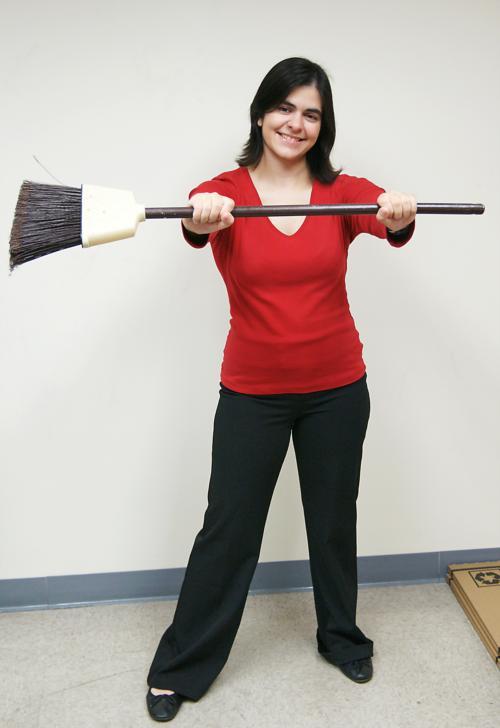
I Believe in a Thing Called Love
It’s amazing how one game of “Whoosh and Bong” can make up for dragging your suitcase into the Littauer parking lot at 4 a.m. to go to the airport.
I’m not sure what higher force decreed for our freshman Alternative Spring Break (ASB) trip to leave for Biloxi, Miss.—which had been in the direct path of Hurricane Katrina—before dawn on Housing Day. But sharing housing assignments in Chicago’s O’Hare Airport—“I’m in Eliot!” and “I’m in Currier?”—was the first experience out of many that drew us closer together.
The following morning, as we waited groggily to get picked up to go to our first day of work, one of the freshmen on our trip, Lester Kim ’11, taught us the game “Whoosh and Bong.” As he swept his arms in one direction in a “whoosh” and swept them in another in a “bong,” he enlightened our circle about how to whoosh and bong each other.
As we practiced, he added, “It’s kind of boring at first because it’s only whoosh and bong—but then you get to the lonely minotaur and crazy labyrinth of death!”
The circle burst out laughing. Lester innocently asked, “Why are you laughing?”
Just as during “Whoosh and Bong,” our group of 10 freshmen—formerly strangers to one another—grew together as we worked together. Carrying the rotting wooden planks of a fallen home out of a marsh, shoveling chunks of grass out of wetlands to plant trees there, filling in the white spots of a shed built over the site of a fallen home with red paint and love: all were opportunities to learn and grow.
On Easter Sunday—a few days after arriving in Biloxi—we took a day trip to New Orleans. Encountering a skyline of majestic skyscrapers that could have belonged to any city, I found myself filled with immense love for this vast country. As Dvorak’s “New World” symphony played on my iPod, the city felt like a new world I was discovering for the first time. This is America: one body of many co-dependent parts—interstates flowing like arteries and one common heart beating forever into the dawn.
For a while, New Orleans did feel like a part of America that was thriving. My friends and I relished the sweeping white columns of St. Louis Cathedral—a church flooded during Hurricane Katrina, but now glowing white and gold. In the French Quarter, we browsed souvenir shops, sampled pralines, and listened to a jazz band perform in an outdoor cafe.
But after delighting in the bustle of the French Quarter, we saw another part of New Orleans that didn’t look like America at all—the Ninth Ward. Gabe Unger ’11’s friend from New Orleans, Kimble Wright, and his mom led us around the Ninth Ward by car, where we encountered dozens of deserted stores and shopping malls.
As the closed roller coasters of Six Flags rose over the highway, ghostly in the distance, Kimble said from the passenger’s seat, “Then Katrina, the ride of our lives came.”
Homes were still boarded up; water damage gaped through the walls; and the grass, unattended, had grown high. X’s and O’s were sprayed on the boards—signifying not hugs and kisses, but often how many people had died in that home during the storm.
The lower Ninth Ward was a ghost town—no inhabitants, no volunteers, no government officials.
“You see stuff that’s being repaired; you see stuff that’s falling down right next to it!” Mrs. Wright told us. “It’s a matter of the haves and have-nots. If you don’t have, you have to wait even more because you’re not in control—you have to wait for someone else to come help you.”
During the ride, I discovered that Kimble had been hoping to transfer to Harvard from Loyola University in New Orleans—but then found out that Harvard was discontinuing its transfer program. An Exeter graduate and aspiring sports broadcast journalist, Kimble works four to five jobs to pay his tuition at Loyola.
As so many connections came to light on the trip—between my life and the lives of those I met—I realized we’re all part of one larger human family. It’s encouraging to remember that six billion others are facing the same human condition. And it’s not hard to find a few good people out of those six billion with whom to face our challenges together. I found such companions on my freshman ASB trip. As we woke at seven every morning to greet days filled with conscious endeavor—together—I realized what life is about. It’s about building meaningful relationships—striving with friends for a purpose beyond ourselves.
While clearing land for a new home where an old one stood, I asked a local teenager who worked with us—Nelson Walker—what he thought life was about.
“Love,” he said. “You guys are so full of love—that’s why I enjoy being around you.”
Nelson had left college so that he could work with the Land Trust to help rebuild homes after Katrina. Above his own personal success, he placed love for his neighbor.
For a week, our ASB group to an extent also let love define our lives. Now, I just hope we’ll sow the seeds of love as we go forward in life—not in spite of busy schedules, but because of them as we fill our time with work and meaning.
As facetious as “Whoosh and Bong” may be, someday we’re all going to have to enter the crazy labyrinth. So, rather than be lonely minotaurs, I think it’s worth facing the labyrinth together, armed with the one thing that can defeat the darkness: love.
An avenue called Elysian Fields leads between the Ninth Ward and the French Quarter. Maybe—just maybe—volunteers will bring from the French Quarter to the Ninth Ward an element of paradise.


